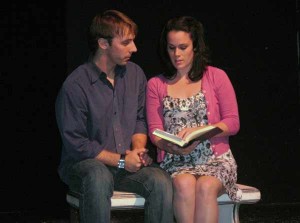New production reflects bold ambitions
The Ark Theatre Company’s new production of The Taming of the Shrew presents a refreshing and bold take on Shakespeare’s classic romantic comedy. Actors perform in modern dress and present a plot that, while still adhering to the original text, has modern undertones.

Contemporary duets · Lucientio (Brad Satterwhite, left) and Bianca (Carolyn Marie Wright) exemplify Wagar’s attempt to modernize a Shakespeare classic. Modern dress and undertones fuel Wagar’s rendition. - Photo courtesy of Philip Sokoloff
In accordance with director Paul Wagar’s conviction that “the play didn’t need adapting, just playing what’s there with different assumptions,” the performance adheres precisely to the original plotline, complete with Shakespearean vernacular.
The Taming of the Shrew explores societal expectations for men and women and uses disguise, deceit and slapstick to embellish the play with color and comedy.
Baptista Manola (Walt Gray) is a wealthy man of Padua with two daughters: the beautiful, mild-mannered Bianca (Carolyn Marie Wright) desired by many men for marriage and the ill-tempered, aggressive Katherine (Sarah Kay Watson).
Much to the chagrin of Bianca’s suitors, Lucentio (Brad Satterwhite) and Gremio (Jared Dagar), Manola will not allow Bianca to marry until Katherine is wed.
The suitors’ woes are alleviated with the arrival of Petruchio (Joe Tower), a brash young man who agrees to marry Katherine and subsequently “tame the shrew out of her.”
Wagar’s rendition features two distinct plotlines: the relationship between Katherine and Petruchio and the game of disguise to decide who will marry Bianca.
After marrying the unwilling and unruly Katherine, Petruchio commences his quest to “tame” her, which he accomplishes by depriving her of food, sleep and clothing.
Though a few details of the intricate plot are lost in Shakespeare’s esoteric vernacular, the play successfully conveys the general story in a comprehensible and clear manner — a difficult feat when reproducing Shakespeare for a modern audience.
At times it is difficult to distinguish certain characters, and the audience’s perception of the play’s setting is obscured. But Wagar’s minimalism emphasizes the underlying themes of the play without relying on elaborate costumes or sets, and it proves to be somewhat refreshing.
Because of Wagar’s direction, the audience is able to appreciate the story’s subject matter and listen to the characters’ voices without feeling disconnected from the material, as is often the case in period pieces.
Unfortunately, Wagar’s tactics don’t redeem every aspect of the play. The plot’s delivery suffers from several of the actors’ stage fright, resulting in dropped lines and performances that come off unnatural and cartoonish.
Though the production suffers from acting nerves, the exploration of the relationship between Kate and Petruchio is timeless and poignant, saving the play from falling into sub-par moments. Their relationship undoubtedly shines as the show-stealer, thanks to supreme performances by Watson and Tower and a unique exploration of Petruchio’s reaction to his “tamed” wife.
Petruchio’s relentless cruelty and undeniable wit coincides with the gradual corrosion of Katherine’s body, mind and spirit, creating a chilling and moving portrayal of the break down of one human at the hands of another, a theme that resounds powerfully and timelessly with any audience.
Katherine reaches her breaking point while traveling back to Padua, when Petruchio forces her to vocally contradict known facts in nature, resulting in a heartbreaking exposure of male dominance.
In the final scene, Katherine presents her famous monologue in which she chides her sister for failing to live up to a wife’s duty as gentle servant to her “loving lord” or husband, proving to her disbelieving friends and family that she has been tamed.
Watson’s words are poignant and unwavering, and her demeanor is so heartfelt and gentle it’s impossible to take your eyes off her.
Perhaps the most defining moment in the play is the unforgettable expression that clouds Petruchio’s face when he embraces his wife after her passionate speech.
Rather than conveying pride at the submissive woman Pertruchio sculpts from a shrew, his face is consumed with shame and guilt. He finally realized that he smothered Katherine’s fire and spirit, the very things that initially made her fascinating.
Tower’s ability to convey this realization with no more than a simple tortured look speaks volumes about his mastery as an actor. The director’s choice to conclude the play with Petruchio’s reaction adds an interesting dimension to the story and further appeals to a modern audience less inclined to accept a story about a woman’s inferiority to her husband.
The Taming of the Shrew runs Nov. 11 through Nov. 20 with performances every Friday and Saturday at 8 p.m. and every Sunday at 7 p.m. For ticketing, visit www.arktheatre.org.
